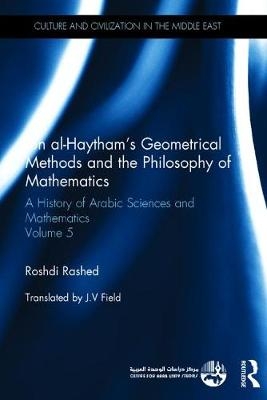
Ibn al-Haytham's Geometrical Methods and the Philosophy of Mathematics
Routledge (Verlag)
978-0-415-58219-3 (ISBN)
This fifth volume of A History of Arabic Sciences and Mathematics is complemented by four preceding volumes which focused on the main chapters of classical mathematics: infinitesimal geometry, theory of conics and its applications, spherical geometry, mathematical astronomy, etc.
This book includes seven main works of Ibn al-Haytham (Alhazen) and of two of his predecessors, Thābit ibn Qurra and al-Sijzī:
The circle, its transformations and its properties;
Analysis and synthesis: the founding of analytical art;
A new mathematical discipline: the Knowns;
The geometrisation of place;
Analysis and synthesis: examples of the geometry of triangles;
Axiomatic method and invention: Thābit ibn Qurra;
The idea of an Ars Inveniendi: al-Sijzī.
Including extensive commentary from one of the world’s foremost authorities on the subject, this fundamental text is essential reading for historians and mathematicians at the most advanced levels of research.
Roshdi Rashed is one of the most eminent authorities on Arabic mathematics and the exact sciences. A historian and philosopher of mathematics and science and a highly celebrated epistemologist, he is currently Emeritus Research Director (distinguished class) at the Centre National de la Recherche Scientifique (CNRS) in Paris, and is the former Director of the Centre for History of Medieval Science and Philosophy at the University of Paris (Denis Diderot, Paris VII). He also holds an Honorary Professorship at the University of Tokyo and an Emeritus Professorship at the University of Mansourah in Egypt. J. V. Field is a historian of science, and is a Visiting Research Fellow in the Department of History of Art and Screen Media, Birkbeck, University of London, UK.
Foreword Preface CHAPTER I: THE PROPERTIES OF THE CIRCLE INTRODUCTION 1. The concept of homothety 2. Euclid, Pappus and Ibn al-Haytham: on homothety 3. Ibn al-Haytham and homothety as a point by point transformation 4. History of the text MATHEMATICAL COMMENTARY TRANSLATED TEXT: On the Properties of Circles CHAPTER II: THE ANALYTICAL ART IN THE TENTH TO ELEVENTH CENTURIES INTRODUCTION 1. The rebirth of a subject 2. Analytical art: discipline and method 3. The analytical art and the new discipline: ‘The Knowns’ 4. History of the texts On Analysis and Synthesis The Knowns I. ANALYSIS AND SYNTHESIS: MATHEMATICAL METHOD AND DISCIPLINE MATHEMATICAL COMMENTARY 1. The double classification of Analysis and Synthesis Preliminary propositions Analysis and synthesis in arithmetic Analysis and synthesis in geometry Analysis and synthesis in astronomy Analysis in music 2. Applications of analysis and synthesis in number theory and in geometry Number theory Perfect Numbers Two indeterminate systems of equations of the first degree Geometrical problems Problem in plane geometry Problem solved with the help of transformations Construction of a circle to touch three given circles xii CONTENTS Auxiliary problem Geometrical commentary on the problem Algebraic commentary on the auxiliary problem TRANSLATED TEXT: On Analysis and Synthesis II. THE KNOWNS: A NEW GEOMETRICAL DISCIPLINE INTRODUCTION MATHEMATICAL COMMENTARY 1. Properties of position and of form and geometrical transformations 2. Invariant properties of ge
| Erscheint lt. Verlag | 19.4.2017 |
|---|---|
| Reihe/Serie | Culture and Civilization in the Middle East |
| Verlagsort | London |
| Sprache | englisch |
| Maße | 156 x 234 mm |
| Gewicht | 1020 g |
| Themenwelt | Geschichte ► Allgemeine Geschichte ► Mittelalter |
| Geisteswissenschaften ► Geschichte ► Regional- / Ländergeschichte | |
| Naturwissenschaften | |
| ISBN-10 | 0-415-58219-9 / 0415582199 |
| ISBN-13 | 978-0-415-58219-3 / 9780415582193 |
| Zustand | Neuware |
| Haben Sie eine Frage zum Produkt? |
aus dem Bereich


